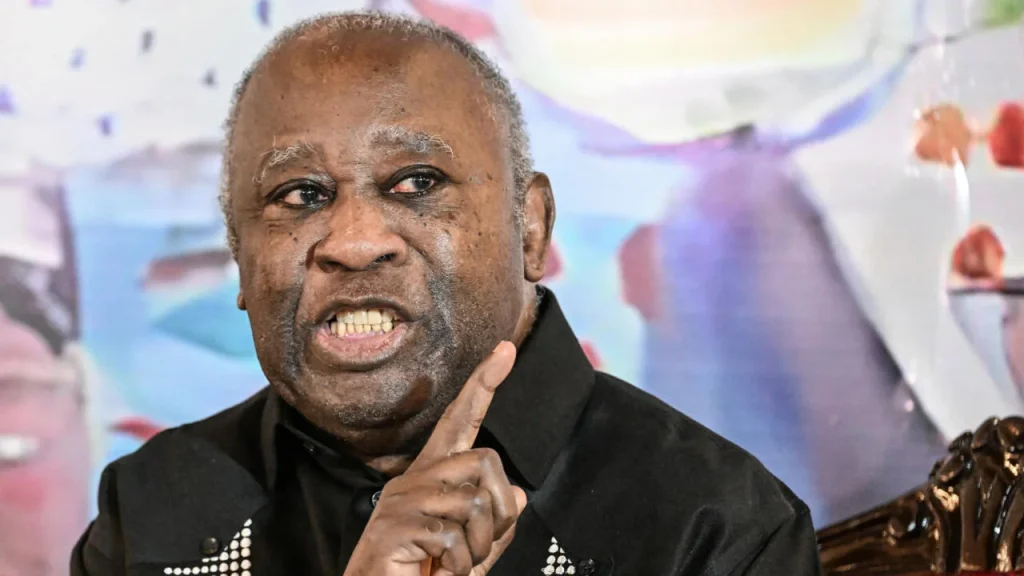On March 9, 2024, former Côte d’Ivoire President Laurent Gbagbo announced his candidacy for the 2025 presidential election, leading his African People’s Party – Côte d’Ivoire (PPA-CI), as confirmed by spokesman Katinan Kone after a party central committee meeting in Abidjan. Gbagbo, who served as president from 2000 to 2011, launched PPA-CI in 2021 upon returning to Côte d’Ivoire after his 2019 acquittal by the International Criminal Court (ICC) in The Hague on war crimes charges related to the 2010-2011 post-election civil war. Despite losing control of his former party, the Ivorian Popular Front (FPI), to a former ally during his imprisonment, Gbagbo retains a significant and loyal support base, making him a formidable contender for the October 25, 2025, election.
Legal and Political Challenges
Gbagbo’s candidacy faces significant hurdles due to his ineligibility stemming from a 20-year prison sentence in Côte d’Ivoire for the 2011 looting of the Central Bank of West African States (BCEAO) during the post-election crisis, which claimed over 3,000 lives. Although acquitted by the ICC and pardoned by President Alassane Ouattara in 2022 for the BCEAO case, Gbagbo remains struck from the electoral roll, barring him from running or voting, as confirmed by the Independent Electoral Commission (CEI) on June 4, 2025. His PPA-CI party, alongside allies like the PDCI, has demanded his reinstatement, staging protests like the August 9, 2025, march in Yopougon, Abidjan, calling for an “inclusive and peaceful” election. Gbagbo’s supporters, including PPA-CI Secretary-General Jean-Gervais Tchéidé, argue for an amnesty, framing his exclusion as a political maneuver by Ouattara’s government.
The Political Landscape
The 2025 election is shaping up to be highly contentious. Incumbent President Alassane Ouattara, aged 83 and in power since 2011, announced in July 2025 his intent to run for a fourth term under the Rally of Houphouëtists for Democracy and Peace (RHDP), despite opposition claims that this violates constitutional term limits. Tidjane Thiam, former CEO of Credit Suisse and president of the Democratic Party of Côte d’Ivoire (PDCI) since December 2023, was a potential contender but was barred from the electoral list in April 2025 due to a court ruling questioning his Ivorian nationality, leaving PDCI without a candidate. Other opposition figures, including Charles Blé Goudé and Guillaume Soro, also face exclusions due to past convictions, prompting accusations of “legal strangulation” by Ouattara’s regime. Simone Ehivet Gbagbo (MGC) and Pascal Affi N’Guessan (FPI) remain eligible opposition candidates.
A Polarizing Figure and Fragile Democracy
Gbagbo’s decision to run, despite his ineligibility, positions him as a polarizing yet influential figure, with supporters viewing him as a symbol of resistance against Ouattara’s neoliberal policies. His PPA-CI has struggled electorally, winning only two communes in the 2023 local elections, but his loyal base and efforts to unite opposition parties, including talks with PDCI, MGC, and others since July 2024, signal a strategic push for relevance. Côte d’Ivoire’s history of electoral violence, notably the 2010 crisis, fuels concerns, with analysts like Eddi Bibi Junior urging inclusive dialogue to prevent unrest. X posts reflect mixed sentiments, with some praising Gbagbo’s resilience—“Gbagbo’s back to shake things up!”—while others question his viability, noting, “How can he run if he’s off the voter list?” The CEI’s exclusion of key opposition figures has raised fears of a rigged process, with Thiam appealing to the UN Human Rights Committee.
Outlook and Implications
Gbagbo’s candidacy, though legally constrained, underscores Côte d’Ivoire’s tense political climate as the October 2025 election approaches. His PPA-CI continues to push for electoral reforms, including an extended voter registration period, while Ouattara’s RHDP maintains a strong grip, winning 123 of 201 municipalities in 2023. Gbagbo’s exclusion, alongside Thiam’s, risks escalating tensions, with the opposition’s Coalition for Peaceful Alternation in Côte d’Ivoire (CAP-CI) struggling to present a unified front. Whether Gbagbo secures amnesty or pursues an appeal, his participation could reshape the race, though analysts doubt his chances of winning due to PPA-CI’s limited recent electoral success. The coming months will test Côte d’Ivoire’s democratic resilience amid fears of repeating past electoral violence.






